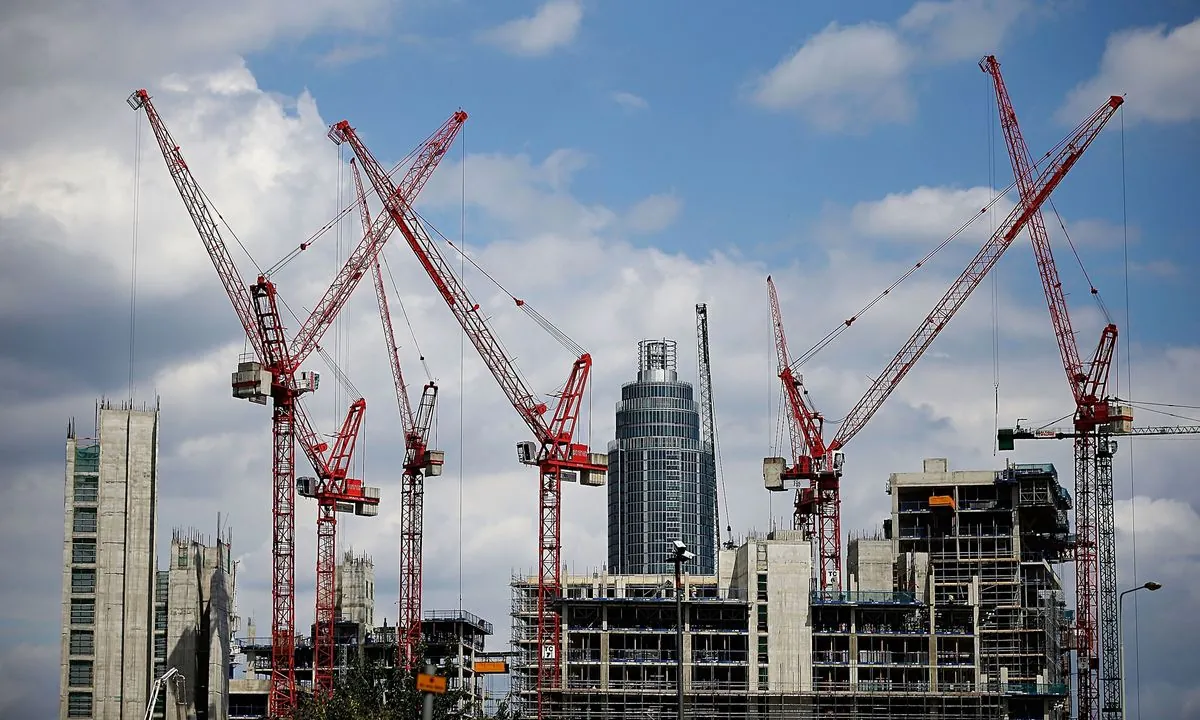UK Construction Sector Surges to 30-Month High Amid Economic Shifts
UK construction growth hits 30-month peak, driven by civil engineering and housing. Lower interest rates and political stability boost sector, but concerns loom over potential budget cuts and rising costs.

The UK construction sector experienced a significant upturn in September 2023, reaching its highest growth rate in two and a half years. This surge was primarily driven by advancements in civil engineering and a revival in house-building activities. The S&P Global/CIPS UK Construction Purchasing Managers' Index (PMI) rose to 57.2, marking the strongest performance since April 2022.
Several factors contributed to this growth, including reduced borrowing costs and increased political stability following the Labour Party's election victory in July 2023. Tim Moore, economics director at S&P Global Market Intelligence, noted that infrastructure projects related to energy security and renewables played a significant role in boosting the sector.

The Construction Industry Council (CIC), which represents professional bodies in the UK construction industry, has likely welcomed this growth, as the sector contributes approximately 6% to the country's GDP. This positive trend aligns with the goals set by the Construction Strategy 2025, introduced in 2013 to enhance efficiency and reduce costs in construction projects.
However, the industry faces challenges. Construction firms reported the steepest increase in input costs in 16 months, highlighting ongoing inflationary pressures. This situation underscores the importance of initiatives like the Modern Methods of Construction (MMC), which aim to promote innovative and cost-effective building techniques.
"Some taxes might go up as the new government seeks to boost public services and investment."
The upcoming budget statement by Rachel Reeves on October 30, 2023, has raised concerns among some companies about potential spending cuts and tax increases. This uncertainty has led to a five-month low in business optimism, despite the overall positive growth.
The Bank of England's stance on interest rates adds another layer to the economic landscape. Governor Andrew Bailey has indicated the possibility of more aggressive rate cuts if inflation pressures continue to weaken. This approach could further stimulate the construction sector, which has already benefited from lower borrowing costs.
It's worth noting that while the construction industry is experiencing growth, it also faces significant challenges. The Health and Safety Executive (HSE) reports that construction accounts for the largest number of fatal injuries across all UK industries, emphasizing the need for continued focus on safety measures such as the Construction Skills Certification Scheme (CSCS).
The sector's performance is particularly impressive given the UK government's ambitious target to reduce greenhouse gas emissions by 50% by 2025 compared to 1990 levels. This goal aligns with the work of organizations like the UK Green Building Council, established in 2007 to promote sustainability in the built environment.
As the industry moves forward, the role of bodies such as the Chartered Institute of Building (CIOB), founded in 1834, and the Construction Leadership Council (CLC), established in 2013, will be crucial in navigating the challenges and opportunities ahead. Their expertise will be invaluable in maintaining the sector's growth while addressing issues of sustainability, safety, and economic stability.


































